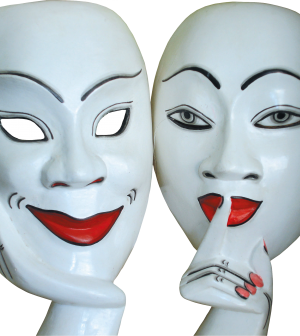- Belgium comes to Yamashita Park
- Residential Villa in Phuket Entices Remote Workers With Long-Stay Rates
- Rare pieces of French glass art at the Mirai Museum of Art
- Feast on fresh fish and seafood at the 2024 ‘Sakana’ Festival
- Would you like to ride in a Louis Vuitton gondola lift?
- Naked Snow Aquarium
- Festive lights at Yomiuriland will get you feeling the holiday vibes
Honne and Tatemae

The concepts of tatemae and honne are deeply embedded in the Japanese psyche. Many foreigners living in Japan get frustrated by how difficult, if not impossible, it is to get behind the tatemae (the “face” that a Japanese person shows to the world) and really connect with the honne or true self of their Japanese friends and colleagues. Indeed I have heard many foreign residents who, even after decades-long relationships with their Japanese friends, find it difficult to get beyond the formal tatemae and cultivate the type of deep friendships they are used to having with people in other cultures.
It is easy to be critical of this aspect of the Japanese culture. As someone from outside it can seem like you are being judged or deliberately kept at a distance. It can feel extremely frustrating after being friends with a Japanese person for years to still not feel like you really know much about them.
The reality, however, is that every culture has this difference between public self and private self. It is an integral part of the human experience. It is perfectly natural to put your best self forward in work situations in order to get ahead in your career. It is functional and adaptive to pretend to believe what those around you believe so that you can fit in and benefit from the safety, security and comfort of belonging to a group. While the line between what is public and private varies significantly across cultures, it is perfectly normal to keep certain aspects of ourselves private – even from those we are closest to.
But what happens when you cannot even show your true self to yourself?
Many people go through life kidding themselves about who they really are and what they really want. Mostly because it is difficult to let ourselves see those parts of ourselves that we don’t want to admit. The parts of ourselves that are greedy, selfish, lazy, narcissistic, egotistical, chronically angry, jealous, mean, compulsive, obsessive, illogical, and petty are difficult to face. We don’t want to acknowledge our dark sides because we fear that doing so makes us weak at best, and downright evil at worst.
The good news is that facing up to your dark side can actually make you a stronger person as well as a better one. No matter how great job of a job you do deluding yourself that you do not have these negative characteristics, others around you see them. Probably those closest to you have tried to enlighten you on multiple occasions, but you have managed to ignore their feedback, deny their accusations and, if you are really skillful at self-deception, even turn it around and make it their fault. At some level, however, your subconscious recognizes the truth in what they have said or you wouldn’t be going to so much trouble to deny it.
There is a second version of hiding one’s true self that is very common. While some spend their lives trying to deny their dark side, others spend their lives wallowing in it. Commonly referred to as low self-esteem, this false sense of being utterly flawed is no more accurate a picture of one’s true self than the picture of oneself as being flawless. Just as those who won’t acknowledge their weaknesses are not seeing their true selves, those who refuse to give equal time to their strengths are hiding from the truth of who they are.
Depression, mid-life crisis, stress, dissatisfaction, boredom, addiction, materialism, isolation – all of these are symptoms of denial of our true selves. People use huge amounts of energy trying to hide from their dark side or deny their magnificence. Facing up to the truth of who you are frees up all of this energy and puts you in a position to make true progress towards becoming the best person that you can be.
Whether the face we put forward is one of false strength or one of false weakness, neither of these is real. True strength comes from learning to look in the mirror and simply acknowledge the reality of what is there – the good, the bad, the ugly, and the beautiful. So the next time you find yourself getting frustrated by the entrenched tatemae of the Japanese people in your life, use it as an opportunity to look at the ways that you are not letting your true self shine through. I can guarantee that if you take steps to be more honest with yourself and act on these insights, you will free up the energy, strength, and creativity to live a truly prosperous and authentic life.















